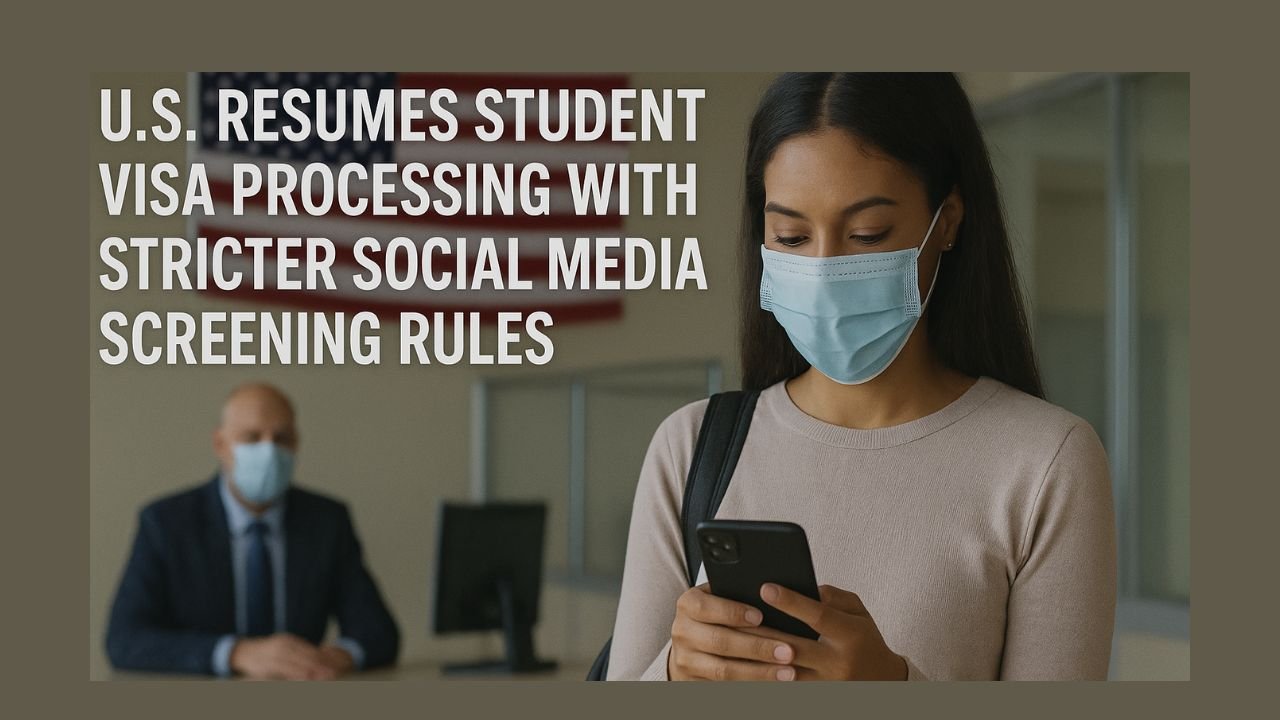The U.S. State Department announced Wednesday that it has resumed the processing of student visa applications for international applicants.
However, in a significant policy shift, applicants must now grant consular officers access to their social media accounts, a move aimed at intensifying background checks and screening procedures.
According to the department, this new rule is intended to detect any content that might suggest hostility toward the United States, its government, institutions, culture, or foundational values.
The decision follows a brief suspension of new student visa interviews last month as part of an effort to expand security vetting protocols.
Refusal to Share Social Media May Lead to Rejection
As part of the updated visa process, all foreign student applicants must set their social media profiles to public for government inspection. Failure to comply could result in their application being denied.
The State Department stated that refusing access may be interpreted as an attempt to conceal online activity or evade scrutiny.
This policy applies universally and without exception, reinforcing the department’s commitment to what it describes as “thorough national security screening.”
Students Rush to Book Visa Appointments
The resumption of visa services comes as a relief to thousands of students worldwide who had been anxiously awaiting the reopening of U.S. consulates.
With time running short before the start of the fall semester, many students were struggling to finalize travel plans and housing arrangements.
Among them is a 27-year-old Ph.D. student from China, currently studying in Toronto, who managed to secure a visa interview for the following week.
The student, identified only as Chen, expressed his relief, saying, “I’ve been refreshing the website a couple of times every day.”
Global Monitoring by Student Applicants
Students from countries including China, India, Mexico, and the Philippines have taken to social media platforms to share updates, tips, and anxieties about booking visa appointments.
Many are closely following U.S. State Department briefings, looking for any sign of resuming operations at American embassies and consulates worldwide.
New Priority for U.S. Colleges with Fewer International Students
In internal directives to its embassies, the State Department has instructed consulates to prioritize students enrolling at institutions where international students make up less than 15% of the population.
According to officials familiar with the policy, this move is designed to diversify the distribution of foreign students across U.S. colleges.
However, this guideline could affect enrollment at nearly 200 U.S. universities, including all eight Ivy League schools and major public institutions like the University of Illinois and Pennsylvania State University, where international students often represent more than 15% of the student body.
Increased Scrutiny and Shifting Immigration Policies
This move comes amid a broader trend of increased scrutiny directed toward international students. Earlier this year, the Trump administration temporarily revoked the legal status of thousands of foreign students, some over minor offenses, although the decision was later reversed following backlash.
Furthermore, immigration officials have expanded the list of violations that could result in foreign students losing their legal status.
These measures are widely seen as part of a larger immigration tightening agenda under the Trump administration.
Targeting Prestigious Universities
The administration has also specifically targeted elite institutions. Harvard University, for example, has come under fire, with the President proposing a cap on foreign student enrollment at 15%.
Harvard, where international students make up roughly a quarter of the student body, relies heavily on their tuition and global diversity.
Critics argue that this pressure campaign is part of a broader effort to restrict foreign influence and increase domestic control over U.S. higher education.
Concerns Over Political Censorship and Free Speech
The policy requiring social media screening has raised serious civil liberties concerns. Jameel Jaffer, executive director of the Knight First Amendment Institute at Columbia University, compared the move to Cold War-era ideological vetting, where prominent foreign intellectuals and artists were barred entry due to their political views.
“This policy makes a censor of every consular officer,” Jaffer said, “and it will inevitably chill legitimate political speech both inside and outside the United States.”
Potential Expansion of Travel Restrictions
Separately, the Trump administration is calling on 36 countries to enhance their traveler vetting systems. Nations that fail to comply within a 60-day period risk being added to an expanded U.S. travel ban list, which already includes 12 countries.
The directive was communicated through a weekend diplomatic cable and signals a further tightening of U.S. border policies.
The resumption of student visa processing offers hope to international students eager to begin or continue their education in the U.S., but it also introduces new hurdles in the form of invasive digital screening.
As the social media vetting requirement takes effect, critics warn it may have a chilling effect on freedom of expression and international collaboration in higher education.
While the U.S. government emphasizes national security, institutions and advocacy groups argue that overreach may compromise the openness and innovation that make American universities globally competitive.
The coming months will likely test how this balance unfolds as thousands of students prepare for the upcoming academic year under heightened surveillance and evolving immigration rules.




